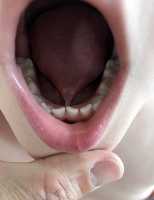
22 Nov Complications Following Frenotomy for Ankyloglossia (tongue-tied)
MedicalResearch.com Interview with:

Dr. Wheeler
Ben Wheeler,MB ChB(Otago) DCH PhD CCE FRACP
Paediatrician, Associate
Department of Women’s and Children’s Health (Dunedin)
University of Otag
MedicalResearch.com: What is the background for this study?
Response: All tongues have a frenulum, which is a small band of tissue that helps connect them to the floor of the mouth. Tongue tie (or ankyloglossia) is when this frenulum causes restriction to the movement of the tongue, and can interfere with successful breastfeeding in infants. This may be improved with an operation to cut the frenulum of the tongue (frenotomy). Internationally, tongue-tie diagnosis and treatment has increased substantially (reported at over 10-15% in some locations). This has led to growing concerns of potential overtreatment. The surgical treatment is often discussed as a minor surgery with little risk, but there is growing awareness this may not be the case. There is a paucity of studies examining moderate to severe complications following frenotomy.
Therefore we aimed to determine rates of moderate to severe complications of tongue tie procedures presenting to hospital-based paediatricians in New Zealand, and describe this population.
MedicalResearch.com: What are the main findings?
Response: The main finding of this study is that moderate to severe complications of frenotomy procedures are occurring in New Zealand. A total of 16 cases of complications arising from frenotomy were confirmed. The overall average annual incidence rate was 13.9/100 000. Geographic variation was noted with a peak of 85.6/100 000 in one region.
Complications reported: poor feeding (44%), respiratory events (25%), pain (19%), bleeding (19%) and weight loss (19%). Three children (19%) also had delayed diagnosis of an underlying medical condition initially overlooked in favour of treating their ankyloglossia, this has not previously been reported. The majority (75%) of cases required admission to hospital. Treatments given included supplementary feeds (44%), surgical intervention (25%), breastfeeding support (19%), analgesia (13%) and blood products (13%). A total of 25% of children had one or more frenotomies prior to their complication; 50% were treated for two or more of: ‘anterior’ ankyloglossia, ‘posterior’ankyloglossia or ‘lip tie’; 50% had their frenotomies performed out of the hospital. Dentists were the most common performing practitioner (31%).
MedicalResearch.com: What should readers take away from your report?
1) Complications following tongue-tie surgery are occurring that require assessment and admission by hospital-based Paediatricians in New Zealand, with a significant geographical variation. This is a procedure that is not risk free – and families contemplating it should be fully informed of both the potential benefits and risks.
2) Undue focus on a potential tongue-tie as a cause for poor feeding may lead to alternative diagnoses being missed.
3) Respiratory complications such as apnoea are occurring following tongue-tie surgery in community settings that may not be equipped to deal with these.
In the diagnosis and management of ankyloglossia, centralised guidelines with freely accessible breastfeeding support and timely access to specialist second opinions should be considered as the ideal model, before any surgeries are contemplated.
The authors have nothing to disclose.
Citation:
Matthew Hale, Nikki Mills, Liza Edmonds, Patrick Dawes, Nigel Dickson, David Barker, Benjamin J Wheeler. Complications following frenotomy for ankyloglossia: A 24‐month prospective New Zealand Paediatric Surveillance Unit study. Journal of Paediatrics and Child Health, 2019; DOI: 10.1111/jpc.14682
JOIN OUR EMAIL LIST
[mailpoet_form id="5"]We respect your privacy and will never share your details.
Last Modified: [last-modified]
The information on MedicalResearch.com is provided for educational purposes only, and is in no way intended to diagnose, cure, or treat any medical or other condition. Always seek the advice of your physician or other qualified health and ask your doctor any questions you may have regarding a medical condition. In addition to all other limitations and disclaimers in this agreement, service provider and its third party providers disclaim any liability or loss in connection with the content provided on this website.
Last Updated on November 22, 2019 by Marie Benz MD FAAD
